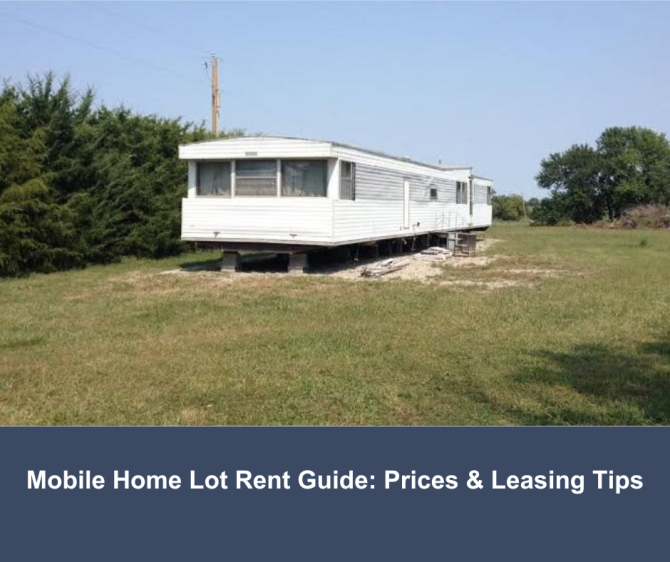Looking for a place to set your mobile home? Renting a lot is one of the most common ways to do it. Whether you're new to mobile home living or just want better info, this guide breaks down everything you need to know about mobile home lots for rent. We’ll cover prices, leasing, pros and cons, and how to avoid costly mistakes.

What Is Mobile Home Lot Rent?
When you rent a mobile home lot, you’re paying to place your home on someone else’s land. This is called mobile home lot rent. You own the house, but not the land it sits on. Lot rent for mobile home often covers more than just the ground. Some parks include water, trash pickup, sewer, and even lawn care. Make sure you ask what’s included before signing anything.
Average Prices of Mobile Home Lot Rent
Lot rent for mobile homes can vary a lot. In many states, the price ranges from $200 to $800 a month. The national average is around $400. If the park offers many extras like a pool, gym, or gated entry, expect to pay more. City parks are often pricier than rural ones.
In places like Florida or California, a lot for rent might cost up to $1,000 a month. In the Midwest or South, the price can be closer to $250. Always check what services are included. What looks like a high price may cover all your utilities, saving money in the long run.
Hurricane-Proof House Plans & Cost Breakdown
Living in storm-prone areas? You might want a hurricane-proof mobile home. These homes meet strict codes and can handle strong winds. Building or buying one costs more, but it pays off in safety.
A basic hurricane-resistant home might start at $60,000. More advanced models can go up to $150,000. Add another $5,000 to $15,000 for setup and anchoring. If you plan to place the home in a storm zone, make sure the mobile home lot you pick allows these upgrades.
What makes a house hurricane-proof?
A hurricane-proof house is built to withstand a storm. This means it must handle high winds and heavy rain, resist flooding, and protect the people inside. It uses smart hurricane-proof house design, strong materials, and solid plans to do this.
Key features include:
-
Roofs shaped to reduce wind pressure
-
Strong walls that won't crack or blow apart
-
Doors and windows with impact-resistant glass
-
Elevated structures to avoid floodwater
-
Good drainage systems move water away from the home
Read also: Hurricane-Proof Houses: Designs, Costs & How to Build One
How to Find the Best Mobile Home Lots for Rent?
Finding the right mobile home lot for rent takes some digging. Here are steps to help:
-
Search Online Listings
Sites like Zillow, Craigslist, and MHBO list lots for rent for mobile homes. You can filter by location, price, and features. Make a list of options and start calling.
-
Visit Mobile Home Parks
Drive around local mobile home parks. Some don’t post ads online. Look for signs that say "lot for rent" or ask the manager directly.
-
Talk to Residents
Already found a few places? Talk to the people who live there. Ask if they’re happy with the park. Residents can give real insight into the area, rent, and management.
-
Check Zoning Laws
Before signing anything, check the zoning rules. Make sure the lot is approved for mobile homes. Some lots for rent for mobile homes may not meet legal codes or may have hidden fees.
Read also: How to Remove Your Mobile Home and How Much It Costs
What Does Lot Rent Cover?
The exact amount of lot rent varies based on location and amenities, but it often includes:
-
Utility services – Water, sewage, trash removal, and sometimes cable TV or internet.
-
Lawn care – Maintenance of common areas like grass, trees, and landscaping.
-
Community centers & amenities – Some mobile home communities offer tennis courts, fitness centers, or community centers.
-
Garbage collection – Included in most monthly lot rent payments.
-
Infrastructure maintenance – Roads, sidewalks, and lighting within the mobile park.
Leasing a Mobile Home Lot: Tips & What to Watch For
Understanding Lease Agreements
Read the lease from start to finish. Don’t skim. A mobile home lot lease should say how much you’ll pay, what’s included, and the rules you must follow. Look for:
-
Lease length
-
Rent increase terms
-
Maintenance duties
-
Rules for guests and pets
Negotiating Lot Rent & Lease Terms
Yes, you can try to negotiate. Ask for lower rent if the lot has been empty for a while. Some parks offer a free first month or reduced rent for seniors or veterans. Always get changes in writing.
Pros and Cons of Renting a Mobile Home Lot
Advantages
1. Lower Upfront Cost
Buying land is expensive. Renting a lot is cheaper and lets you move in fast.
2. Park Perks
Many parks offer extras like playgrounds, pools, or security. This adds value to your mobile home lot rent.
3. Flexibility
If you need to move, it’s easier to relocate a mobile home from a rented lot than from owned land.
Disadvantages
1. No Land Ownership
You own your home, but not the land. This limits control and can affect resale value.
2. Rent Hikes
Lot rent can go up each year. Some parks raise rates fast, which can stretch your budget.
3. Park Rules
Parks often have strict rules. You may need approval for upgrades or even who stays overnight.
How to Avoid Common Pitfalls When Renting a Mobile Home Lot?
Read Every Line: Don’t assume. Read the full lease.
Know the Rules: Ask for a list of park rules before moving in.
Inspect the Lot: Look for poor drainage, broken pavement, or unsafe hookups.
Talk to Others: Ask residents about their experience with the landlord.
Plan for Rent Increases: Find out how often rent goes up and by how much.
Wrapping It Up
Renting a mobile home lot can be a smart move. It's cheaper than buying land and offers flexibility. But you need to do your homework. Understand what you’re paying for. Read the lease. Ask the right questions. With the right lot, your mobile home can be a great place to live.

